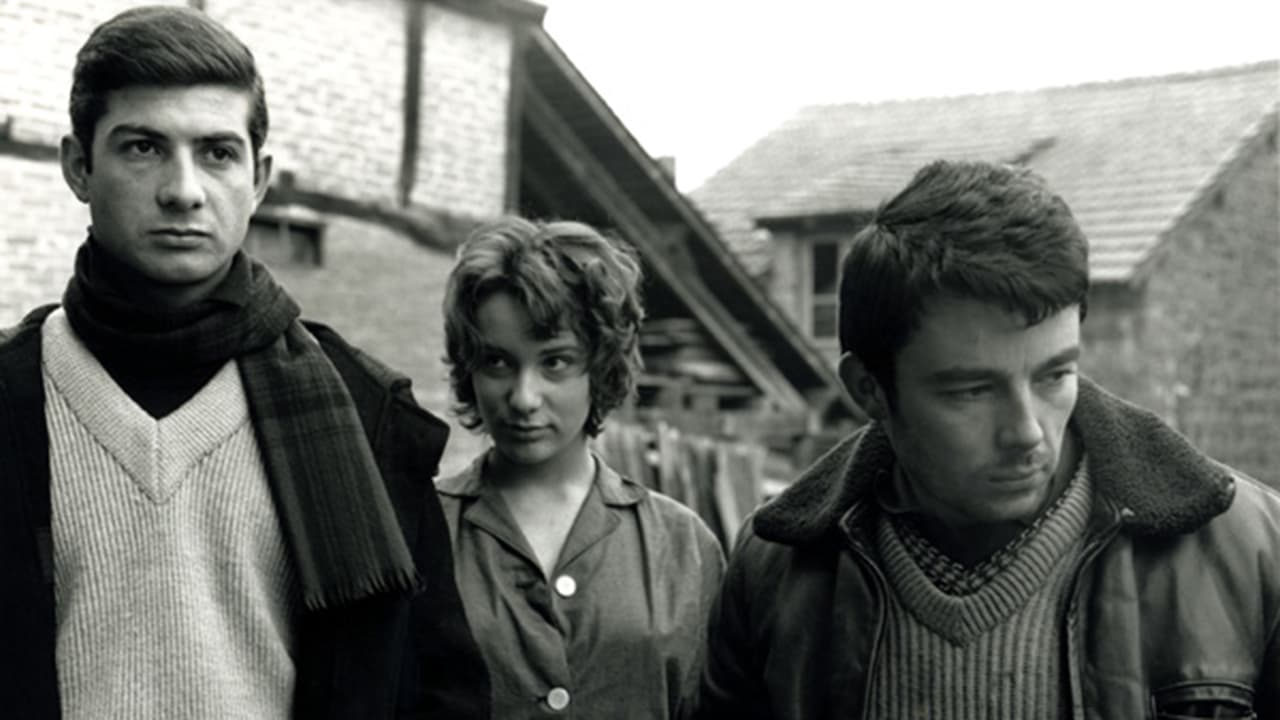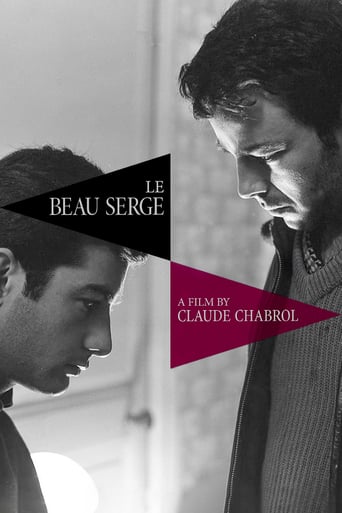



just watch it!
The plot isn't so bad, but the pace of storytelling is too slow which makes people bored. Certain moments are so obvious and unnecessary for the main plot. I would've fast-forwarded those moments if it was an online streaming. The ending looks like implying a sequel, not sure if this movie will get one
View MoreThis film is so real. It treats its characters with so much care and sensitivity.
View MoreWorth seeing just to witness how winsome it is.
'Le Beau Serge' by Claude Chabrol is considered by many to be the first French New Wave to have ever been released. The screenplay written by Chabrol himself focuses on a young man named François Baillou who comes back to his childhood village to spend the winter there. He is amazed by how much the village has changed in his absence. He also encounters his old friend Serge who is now a man living a mundane state of existence with his pregnant wife.With a storyline which involves a character going back to his childhood village, one might expect a film that celebrates nostalgia like 'Cinema Paradiso', however 'Le Beau Serge' is anything but a film that wallows in nostalgia. This film brutally shows the discrepancies in the development and spread of modernity between the big cities and the villages in Post WWII France. The people in this particular village are living in a perennial state of hopelessness. They exist because they have to, they have no ambitions, no opportunities and no real goals. François with his urban sensibilities is horrified by the state of affairs here. The screenplay also gives us a bit of a mirror- like relationship between François and Serge. It is implied that their roles could have easily been reversed had things turned out slightly differently. Serge could have been the one who went to the cities while François could have been trapped in this village. This overwhelms François with a sense of guilt to see his childhood friend live in hopelessness. So he decides to bring in a change in attitude towards life in the village as a whole as well as help Serge in almost a Christ-like fashion.The screenplay falters a bit when it comes to the depiction of female characters. The two major female characters, namely Marie and Yvonne are nothing but two female stereotypes on the opposite ends of the spectrum. Chabrol's direction doesn't really add any depths to these characters. Marie is nothing short of a plot device and her choices in the film make little sense. There is also a very disturbing incident that takes place in the film and the justification given for it made it even more shocking and not in the admirable way. Another flaw in the film is the unnecessary way in which the Christ-like nature of François' motives gets verbally referenced by other characters. It was clear and there need not have been the overt declaration of it.Although this was the first New Wave film, but this was before the release of more monumental works like Truffaut's 'The 400 Blows' and Godard's 'Breathless'. So it doesn't have the unique storytelling and editing techniques that were ushered in by those films and feels a little more standard and conventional. As a matter of fact, 'Le Beau Serge' has a bit of an Italian Neo-realist feel to it due to the way the film depicts the sorry and stagnant nature of life in post-war France. The camera moves a lot in the shots and regularly pans rapidly to a particular portion of the shot to reveal something important. Chabrol also uses a lot of tracking shots in the film. Technically the film is well shot and put together.'Le Beau Serge' was a solid first film for Chabrol, it is well directed, competently acted and the story has something to say. But I believe there are also some flaws in the film that I couldn't overlook. It still deserves to be recommended.
View MoreThis film is considered to be the first film of the French New Wave film movement, preceding 400 Blows, Hiroshima Mon Amour and Breathless. I don't think you can put this film in the same category as those films. This film is a straight up conventional narrative about Francois who travels back to his hometown after 12 years, looking for a peaceful, restful place and recuperating from a lung infection, he finds that the people he once knew are all in dire straits. They are poor, provincial and cant seem to get out of their rut in this small town, the town Chabrol grew up in. Watching this film I didn't quite know in which way it was headed. The acting is superb and I really felt like I was in that small town with these people. Francois former friend turned alcoholic Serge turns in a convincing performance of drowning ambitions. This film was meticulously put together and the moving shots were intelligently fluid and effective. Unlike what other reviewers have said, this does not feel like a film from a first-timer. I have only seen Chabrol's last two films, Inspector Bellamy and A Girl Cut in Two and they were masterful in execution and i expected this one to be weaker but i was delightfully surprised. It holds up really well and I even think modern American audiences would enjoy this film about sacrifice and reformation.
View MoreReleased in a year ahead to the French New Wave landmarkssuch as Hiroshima Mon Amour, The 400 Blows, and Breathless,the first feature of another giant in the movement doesn't reallycontain any innovativeness that the others show off. Rather, LeBeau Serge expresses the modest respect to the directors of oldergenerations in France; especially there is an obvious similaritybetween Le Beau Serge and Bresson's The Diary of CountryPriest. However, like the rest of French New Wave, the film's lowbudget attitude loudly speaks the antithesis to the Frenchmainstream cinema, such as the works of Clement, at the point. Relationships among main characters randomly oscillatebetween friendship and hostility, don't develop, and go nowhere.Consequently the story can't keep the audience's attention.
View MoreIn what is considered the first film of the French New Wave, Claude Chabrol gives us a hypnotic vision of opposites in the same style as Hitchcock's Shadow of a Doubt. Le Beau Serge follows the story of Francois, a young man who returns to his home town after twelve years, who finds that the town is dying. His landlady even tells him that everyone will be gone soon enough. In particular, he finds that a once-promising childhood friend, Serge, is trapped as an alcoholic in a loveless marriage.The brilliance of the film lies not in its storytelling (it is quite slow at parts) nor its acting (most of the actors were non-professionals) but in its structure. Everything is seen in doubles. Francois and Serge are two sides to the same coin. Each has an elder counterpart. Each has a female relation which seems to switch off at times. Serge has both a wife and a mistress who is at one point Francois girlfriend; at the same time, Serge's wife becomes morally attached to Francois. In addition, scenes are doubled; two scenes in the cemetary, two implied sexual scenes in Glomaud's home, two turns by Francois and Michel at the beginning, the list goes on and on. Furthermore, entire shots are doubled with different couples in each. It is brilliant.In addition, the film looks as if it were unpolished (which is a basic tenet of the New Wave), but it looks as if it was a director's first attempt. But that's not necessarily a bad thing.The greatest detraction (apart from the sometimes overacting) is the musical score. It is extremely discordant with regards to the movie. Minimal scenes such as Serge exiting his house are accompanies by percussion that sounds as if it were a harbinger of doom. I don't know if Chabrol wanted this, but it becomes irritating and causes the viewer to laugh at the film.As an added note, watch for the parallels of Francois and Serge with the town's children. The kids pop up everywhere.
View More